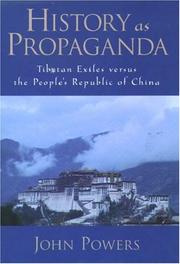| Listing 1 - 1 of 1 |
Sort by
|

ISBN: 0195174267 Year: 2004 Publisher: Oxford : Oxford university press,
Abstract | Keywords | Export | Availability | Bookmark
 Loading...
Loading...Choose an application
- Reference Manager
- EndNote
- RefWorks (Direct export to RefWorks)
Despite Chinese efforts to stop foreign countries from granting him visas, the Dalai Lama has become one of the most recognizable and best loved people on the planet, drawing enormous crowds wherever he goes. By contrast, China's charismatically-challenged leaders attract crowds of protestors waving Tibetan flags and shouting "Free Tibet!" whenever they visit foreign countries. By now most Westerners probably think they understand the political situation in Tibet. But, John Powers argues, most Western scholars of Tibet evince a bias in favor of one side or the other in this continuing struggle. Some of the most emotionally charged rhetoric, says Powers, is found in studies of Tibetan history. History is viewed by both sides as crucial to their claims, and both invest a great deal of energy in producing works that purport to tell the "truth" about Tibet's past. Powers shows that the two sides' views are mutually incompatible and that both sides sincerely believe what they say. Both are operating within a particular psychological context in which certain assumptions guide their inquiry and predetermine their conclusions. Both are so thoroughly convinced of the utter rightness of their paradigms that they cannot even imagine that someone might sincerely hold the opposing view, and so they accuse their opponents of deliberately lying and covering up the "facts" and the "truth." Both reflect the vastly different cultural myths of the societies that produced them. Chinese sources begin with the notion that China is at the center of the world and is the only civilized society, with a mandate to rule over all other countries. Tibetan records are thoroughly infused with Buddhist imagery and presuppositions, and the underlying narrative is the diffusion and glorification of religion. Powers examines works on Tibetan history by Tibetan and Chinese authors that have been produced in English for Western consumption. He finds some of their claims absurd, others highly implausi
Historiography --- Tibetans --- Tibet Autonomous Region (China) --- Historiography. --- Tibet (China)
| Listing 1 - 1 of 1 |
Sort by
|

 Search
Search Feedback
Feedback About UniCat
About UniCat  Help
Help News
News